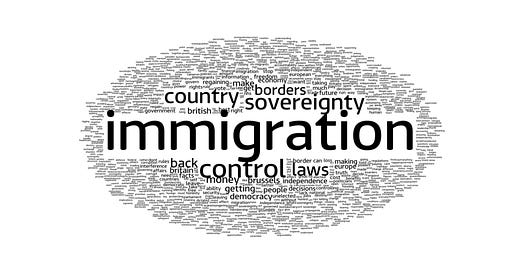It’s now six years on from the Brexit vote and over two years since the official withdrawal, and the form that Brexit will take, protean in the referendum’s immediate aftermath, is now taking solid form. In brief, the referendum victory was the result of a coalition of two groups, a small, elite, ‘global Britain’ group, and a larger, non-elite, anti-immigration group. Unsurprisingly, the former group has got what it wanted, and the latter group has not.
The Brexit coalition
As a successful political movement against the cathedral/liberal elite/establishment or whatever you want to call it, the winning of the 2016 referendum was a major, and unexpected achievement. The dominant factions of both major parties, and a majority of major cultural and business institutions were against it, yet it won regardless. Prior to the 2000s, the issue was barely on the public radar, with James Goldsmith’s Referendum Party gaining only 2.8% of the vote at the 1997 election despite spending a huge amount on advertising and fielding 547 candidates. Opinion polling until a few years before the referendum also showed the issue as being of little importance. The idea of leaving the EU was still the domain of wealthy conservative oddballs like Farage and disaffected Tory MPs, and their allies in the conservative media, concerned with somewhat abstract issues like sovereignty and excessive EU regulation. These issues had been present for decades and had been heightened by the Maastricht Treaty of 1993, but they were not ones that particularly concerned the public at large.
This of course all changed with the immense rise in Eastern European immigration after 2004. Seizing upon this as a way to tie the EU to immigration in general, the elite Brexiteers managed to gain enough support on this issue to win the referendum, as the famous ‘leave voters word cloud’ by the British Election Study makes clear.
From an average leave voter perspective then, this was a vote primarily to reduce immigration, and there is no evidence that it was EU immigration in particular they were concerned about, it was all immigration: EU immigration was the one they were given a vote on. In 2013, 77 per cent of people wanted immigration reduced “a little” or “a lot”, with 56 per cent wanting a large reduction, and we can be pretty confident that most of these people voted for Brexit. But for the elite Brexiteers, exemplified by Daniel Hannan, this was a myth, what Brexit was really about was Global Britain, or Singapore on Thames.
The Brexit they got
In the immediate aftermath of Brexit, it looked like the Conservative party might reorient itself towards Brexit voters concerns, choosing the relatively anti-immigration one-nation conservative Theresa May as leader, who maintained the previous Conservative pledge (which had never, and would never, be fulfilled) of reducing net migration to the tens of thousands. But since her replacement with Boris Johnson, the Global Britain Brexiteer wing has reasserted itself, with the tens of thousands pledge abandoned, immigration now running as high or higher than before Brexit, but with Europeans replaced with Asians and Africans, and two free-market candidates vying for Tory leadership while barely mentioning immigration. While overall levels of concern about immigration have dropped from the highs of a few years ago, 64% of leave voters still want immigration reduced: their main reason for voting for Brexit has not been fulfilled. For now, the ‘lower immigration’ wing of the Brexit coalition seems sunk, having outlived their usefulness to the elite Brexiteers, they have been discarded.







